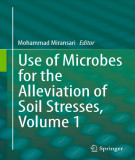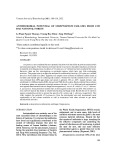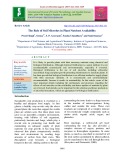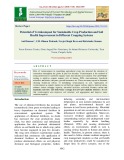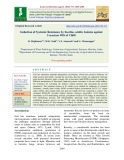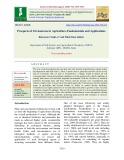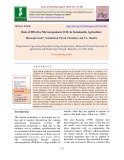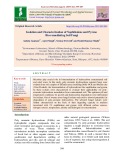
The role of soil microbes
-
Ebook "Use of microbes for the alleviation of soil stresses, Volume 1" describes the most important details and advances related to the alleviation of soil stresses by soil microbes. Comprised of seven chapters, the book reviews the mechanisms by which plant growth promoting rhizobacteria (PGPR) alleviate plant growth under stress; the role of mycorrhizal fungi on the alleviation of drought stress in host plants; how PGPR may alleviate salinity stress on the growth of host plants; and the role of PGPR on the growth of the host plant under the stress of sub optimal root zone temperature.
 166p
166p  manmanthanhla0201
manmanthanhla0201
 26-02-2024
26-02-2024
 3
3
 1
1
 Download
Download
-
Ebook "Molecular mechanisms of plant and microbe coexistence (Soil biology, Volume 15)" presents studies on the complex and manifold interactions of plants and microbes at the population, genomics and proteomics level. The role of soil microbial diversity in enhancing plant health and plant microbe beneficial symbioses is discussed. Microbial communities are shown in the light of evolution.
 491p
491p  tachieuhoa
tachieuhoa
 28-01-2024
28-01-2024
 6
6
 2
2
 Download
Download
-
Streptomyces are considered the most potential microbes with the ability to produce antimicrobial and anticancer agents. These bacteria are found mostly in soil across the globe and play a pivotal role in material recycling processes. Isolation of Streptomyces in Vietnam has been conducted for years.
 8p
8p  vimulcahy
vimulcahy
 18-09-2023
18-09-2023
 3
3
 3
3
 Download
Download
-
Interaction between soil microbes and minerals play a major role in environmental cycling processes, which leads to the mobilization of nutrients from soil components into available forms for biological uptake which enhances crop growth and yield. In the present study four (4) potassium solubilizing bacteria (KSB), eight (8) zinc solubilizing bacteria (ZnSB) and two (2) zinc solubilizing fungi (ZnSF) isolated from Rice, Maize, Cotton and Sorghum rhizosphere soil collected from Student and College farm Rajendranagar PJTSAU Hyderabad.
 11p
11p  nguathienthan8
nguathienthan8
 20-10-2020
20-10-2020
 16
16
 1
1
 Download
Download
-
Neonicotinoid insecticides are widely used nowadays to control many sucking insect-pests in several horticultural crops. They are neurotoxic and systemic in nature and their indiscriminate use may affect both target as well as beneficial insects. They are persistent insecticides and can enter food chain through soil application because of high water solubility. Microbes play an important role in removing toxic insecticides from soil environment and microbial degradation can be considered to be a cost effective mechanism to detoxify the insecticides.
 23p
23p  kethamoi7
kethamoi7
 26-08-2020
26-08-2020
 16
16
 2
2
 Download
Download
-
It is likely to provide plants with their necessary nutrients using chemical and biological fertilization. Although chemical fertilization is a quick method, it is not recommendable economically and environmentally, especially if overused. Biological fertilization is the use of soil microbes including arbuscular mycorrhizal fungi and plant growth promoting rhizobacteria to inoculate plants. It has been proved that biological fertilization is an efficient method to supply plants with their necessary nutrients.
 6p
6p  nguaconbaynhay6
nguaconbaynhay6
 24-06-2020
24-06-2020
 11
11
 0
0
 Download
Download
-
Bio-fertilizer is a substance used to increase the fertility of the soil. It contains microorganisms which helps the soil to gain its nutrient back and make the soil available for cultivation. Bio-fertilizer doesn’t make any kind of pollution, so it is not a threat to use them in the place of the chemical fertilizers which causes a lot of pollution to the environment. Current soil management strategies are mainly dependent on inorganic chemical-based fertilizers, which caused a serious threat to human health and environment.
 7p
7p  angicungduoc5
angicungduoc5
 14-06-2020
14-06-2020
 18
18
 0
0
 Download
Download
-
Role of vermicompost in nourishing agricultural crops has attracted the attention of researchers throughout the globe in past few decades. Vermicompost is the method of using earthworms to transform organic waste into nutrient rich compost. The earthworms’ casting is nutritive organic manure rich in humus, NPK, micronutrients, beneficial microbes, antibiotics, enzymes, growth hormones, etc. There are many reports in literature showing beneficial effects of imbedding vermicompost in soil.
 14p
14p  nguathienthan5
nguathienthan5
 04-06-2020
04-06-2020
 18
18
 0
0
 Download
Download
-
A field experiment was conducted during Kharif season of 2016-17, at the farmer’s fields in village Munshikhera, district Unnao to study the efficacy of halophilic bio fertilizers, Halo Azotobacter (Halo-Azo) and Halo Phosphate Solubilising Bacteria (Halo-PSB) on the growth and productivity of salt tolerant variety of paddy (CSR-36) and residual fertility of post-harvest soil. It is observed that potential salt tolerant variety of paddy in association with halophilic beneficial microbes together can play a greater role to improve the productivity of paddy as well as soil fertility.
 6p
6p  trinhthamhodang1213
trinhthamhodang1213
 30-05-2020
30-05-2020
 7
7
 0
0
 Download
Download
-
Soil has enormous potential antagonistic mechanism, which have positive influence on plant growth and health. Among the microbes, Bacillus subtilis an endospore forming, gram positive bacteria, plays a major role in biocontrol and PGPR activities. Among the different mechanisms of biocontrol, Induced systemic resistance is the one which induces the resistance by activating the defence related enzymes and increasing the growth parameters.
 12p
12p  trinhthamhodang5
trinhthamhodang5
 16-05-2020
16-05-2020
 8
8
 0
0
 Download
Download
-
The role of microorganisms does not just start with nutrient mineralization, organic matter decomposition and ends with it. There is much more a particular microbe can do in soil and its ecosystem. One of such is Trichoderma, a fungus found in almost all soil ecosystem and a varied environment conditions covering normal soil to harsh conditions as marshy land, desert soil and other degraded environment.
 9p
9p  nguaconbaynhay5
nguaconbaynhay5
 11-05-2020
11-05-2020
 12
12
 1
1
 Download
Download
-
Abiotic stresses are major constrains which adversely affect the plant growth and productivity. Among all abiotic stresses, drought is considered as one of the major constraints on agricultural productivity worldwide and is likely to further increase. Hence the need of the hour is to formulate the strategies that can minimize the loss in crop production under drought conditions. One of them being the exploitation of soil microbes which have the capacity to overcome the adverse effects of drought stress.
 11p
11p  angicungduoc4
angicungduoc4
 26-04-2020
26-04-2020
 14
14
 1
1
 Download
Download
-
Phosphorus (P) is limiting for crop yield on > 30% of the world's arable land and, by some estimates, world resources of inexpensive phosphorus may be depleted by 2050 (Vance et al., 2003). It is the second important key plant nutrient after nitrogen. An adequate supply of phosphorus is therefore required for proper functioning and various metabolisms of plants. Majority of phosphorus in soils is fixed and hence, plant available phosphorus is scarcely available despite the abundance of both inorganic and organic phosphorus forms in soils.
 4p
4p  angicungduoc4
angicungduoc4
 26-04-2020
26-04-2020
 38
38
 0
0
 Download
Download
-
Microorganisms play important roles in the recycling of agricultural wastes. Composting is the degradation of organic materials through the activities of diverse microorganisms. The compost generated by bioconversion of agro-residues offers several benefits such as enhanced soil fertility and soil health which can lead to increased agricultural productivity, improved soil biodiversity, reduced ecological risks and a healthier environment. This investigation examined the microbial community dynamics, loads and identification of microbiota at various stages of composting process.
 11p
11p  chauchaungayxua3
chauchaungayxua3
 07-02-2020
07-02-2020
 20
20
 1
1
 Download
Download
-
Agricultural production is mainly depends on the health of soil, which is a measure of a complex set of biological, chemical and physical interactions driven by microorganisms. Effective microorganism increases the beneficial microbial population in the soil for sustainable crop production. Effective Microorganisms are mixed cultures of beneficial naturally-occurring organisms that can be applied as inoculants to increase the microbial diversity of soil ecosystem. They consist mainly of the photosynthesizing bacteria, lactic acid bacteria, yeasts, actinomycetes and fermenting fungi.
 10p
10p  kequaidan2
kequaidan2
 11-12-2019
11-12-2019
 24
24
 0
0
 Download
Download
-
Microbes play crucial role in bioremediation of hydrocarbon contaminated soil and solid waste. In this study, poly-aromatic hydrocarbons resistant fungi were isolated from soil samples of different areas including Delhi-NCR and Meerut city (Uttar Pradesh), the bioremediation of hydrocarbons like naphthalene and pyrene by these isolates were characterized to evaluate their applicability for polyaromatic hydrocarbon remediation from contaminated soil. The optimum pH and temperature conditions for growth and hydrocarbon degradation were determined for isolates.
 9p
9p  cothumenhmong1
cothumenhmong1
 08-12-2019
08-12-2019
 26
26
 2
2
 Download
Download
-
Though alternative methods of controlling insects, rodents, insect pests, pathogens, microbes and weeds have been developed, pesticides could not be replaced. The prosperous role of pesticides in the management of insect pests and diseases is indisputable. However, its nature of non selective toxicity towards other organisms and deposition in the environment warrants the legislation of usage. Pesticide use raises a number of environmental concerns.
 232p
232p  conquynho32
conquynho32
 18-09-2012
18-09-2012
 87
87
 15
15
 Download
Download
CHỦ ĐỀ BẠN MUỐN TÌM








